- Home
- Ralph Peters
Hell or Richmond Page 2
Hell or Richmond Read online
Page 2
“Your Vicksburg campaign was remarkable, sir.”
Accepting the tribute as fair, Grant nodded again. He rummaged deep in his overcoat and produced a leather wallet of fresh cigars. Meade had allowed the first smoke to go out. He declined the offer of a second.
“Be the death of me, these things,” Grant said, lighting up anew. “Couldn’t afford ’em back before the war. Now they send them to me by the crate.” He took his time with the match, letting the flame approach his fingertips, seeking an even burn on the cigar. “Folks in Washington tell me Lee isn’t much more than a reputation nowadays, that he has no spunk left.”
Meade’s hands balled into fists. “I know what’s said. I’ve heard every word and whisper. But let me tell you something outright, General Grant: You’re going to find Lee a formidable opponent. And his soldiers are tough nuts. Don’t underestimate them.”
“Tougher than ours?” Grant asked sharply.
Meade caught the testing tone. “No. Different. Wilder. They don’t quit when you expect them to. We’re better-drilled, better-equipped, morale’s far better than Mr. Greeley would have it … but Lee’s men keep coming at you like Florida cottonmouths.” He gestured southward, across the Rapidan. “Of course, they’re fighting for their homes. But it’s more than that. They like to fight.”
“We don’t?”
“We fight … from a sense of duty. Oh, some men revel in it. Hancock. Barlow, this Harvard buck. Gibbon, Carroll. Young Upton. But you understand me, I think.”
“You don’t think Lee can be beaten?”
Meade stood up. Affronted. He had not said any such thing. It was suddenly a struggle to master his temper.
“Certainly, he can be beaten. He has been beaten. But this army needs to be allowed to fight him, and to fight him with every man and gun it has. It can’t defeat him decisively if entire corps are stripped away in mid-campaign because some congressman heard a noise in his back garden. This army … you have no idea of the restrictions under which I’ve had to act. It’s … it’s…” The foulest language he knew almost escaped him. “Criminal.”
Grant shrugged, a gesture tamed by the bulk of his overcoat. But he smiled truly at last. With brown teeth.
“You’re lucky you didn’t have to answer to Old Brains. Way I did before he came east. Told me everything but how to saddle my horse, and he was getting around to that.” Grant, too, rose to his feet, compact and uninterested in the impression he made. “Talk me through those maps. Tell me what you’d do, if you had the run of things, with no interference.”
The smoke in the tent burned Meade’s lungs and throat, and he fought back another cough. But he was on firmer ground now. He knew the land, knew how to fight on it.
They labored at the maps for over an hour, talking of roads and fords, of rail lines and the supplies required by an army on the move, of food and fodder, artillery trains and the army’s real strength available for duty. They spoke of officers who could be depended upon to fight, and of those who wanted watching or replacement. For a time, all other concerns receded as their profession gripped two old soldiers.
At last, Grant asked: “And your preferred course of action? When the roads dry out?”
“If Richmond’s our objective—”
“Richmond won’t be the objective,” Grant cut him off. “Lee will be. I mean to break his army by this summer.”
The man’s confidence stopped Meade’s breath. Recovering, he continued, “Lee’s army will always shield Richmond. The way to get him to fight is to threaten Richmond.”
“Go on,” Grant said.
“I still favor the eastern axis. Cross at the fords above Fredericksburg and move south fast. Washington’s covered, so you won’t have to split off a corps or more to keep them feeling snug back along the Potomac. Supplies can be shifted along the coast as the army advances. Shorter lines of communications all around.”
Grant kept his eyes on the map, and Meade could feel the man’s gaze settle on Chancellorsville.
“Been tried,” Grant said. “Hasn’t worked.”
“The army’s never been properly led when it was tried.” Meade undid the top button of his uniform. “Oh, why not say it? Burnside wasn’t fit to command this army. We could’ve won at Fredericksburg, I was there. My division broke their line. All for nothing. You’ve never seen such a needless, senseless, damnable debacle. And Chancellorsville. Hooker froze like a hare cornered by a rattlesnake. We could’ve won at Chancellorsville, too. Even after Jackson embarrassed us. We all wanted to attack, all the real generals, to hit back hard. Even Dan Sickles was for attacking, God help us, and he was Hooker’s creature through and through. Lord knows, we had the numbers. We could’ve destroyed Lee’s army then and there, it was split in two and disorganized.” He felt the need to cough, but growled instead. “And what did we do? We just quit. It was … it was despicable.” Infuriated, Meade let his voice rise, abandoning his gentlemanly decorum. “This army’s never been allowed to really fight by its commanders. Little Mac, Burnside, Hooker … damn the whole business to Hell. We’ve wasted years.”
“It was allowed to fight at Gettysburg,” Grant said.
Abandoning society manners, Meade spit into the tobacco fog. “They didn’t have a damned choice. They were shitting themselves, imagining Stuart was going to ravish their women and cut their throats in the night. They were glad to give me free rein then. Oh, weren’t they just? And look what it got me. The damned committee—you know I’ve got to report again tomorrow? I’m interrogated in public like a criminal.” Furious now, he towered over Grant. “I tell you, if this war is lost, it’ll be lost in Washington, not by this army. This is a great army. It just needs the politicians to let it be great.” Abruptly, Meade sagged. “I’ve done the best I could.”
“Sit down, General Meade,” Grant ordered. The words were spoken calmly, but intently. When Meade, ruing his temper, had settled himself in his chair, the general in chief said, “You seem to be under a misapprehension.”
Meade looked up and met those opaque eyes again.
“I’m sorry?”
“This business of you being relieved of command. I expect you to stay at your post.”
“But … General Smith?”
“I’ll find something for Baldy to do. Probably give him a corps. You and I are closer in line than Washington would have it. And, frankly, you know this army, it respects you. You’re the only man who gave it a victory. More than one. Bristoe Station, that Rappahannock business…” He snorted. “We don’t fit together right, I’ll put you out to pasture. But I’d be a fool to do it now and start off on the wrong foot with every man in the Army of the Potomac.” Relaxing now, Grant grinned. “Oh, my western boys would like to see a clean sweep of every officer east of the Appalachians, they’re pissing fire. But you just stand your ground, and they’ll calm down.”
“I’m honored, sir. Positively honored.” Meade caught himself. It didn’t do to sound groveling, after all. But his relief was immeasurable, nearly of the extent he had felt on that last afternoon at Gettysburg. He had not failed. At least, not yet.
Grant stood up and stepped back to the maps. Meade didn’t move. He sensed that Grant had more to say.
“As for me,” the general in chief resumed, “I have no intention of being trapped, bagged up and skinned at a desk in Washington. My headquarters will be with your army. If you can’t bear the thought of me looking over your shoulder, tell me now.” Grant’s eyes turned cold again. “I don’t intend to count your bullets for you, or wipe your nose for you. I’ll tell you where I want you to go and let you decide how to get there. I’ll tell you when I want you to fight, but let you figure out how to do it. If that arrangement suits you, we can go forward.”
“Yes, sir.”
Grant cocked his head above the overcoat’s collar, sizing up a horse he had just purchased. “Now take me around and introduce me to your staff, let them have a sniff. Early tomorrow, I’m going back to Washington, t
hen back out west for a time to tidy things up.” He forgot his cigar as he thought on distant matters. “I’ll miss some of those men … good men, fine men…” He grunted. “Some of ’em I can’t say I’ll miss at all, though. Listen, you might as well ride along with me tomorrow. Since you’ve got that committee business. No sense taking separate trains like we’re the emperor of France and the king of Prussia. And either call me ‘Sam’ or just plain ‘Grant.’ Way it was in Mexico. Doesn’t do to make everything sound like a speech.”
As the two generals stepped out into the rain, Meade said, “I’m afraid you’ll find Virginia a forlorn place, Sam.”
“Going to be a sight more forlorn when we’re through with it,” Grant told him.
March 11, 1864
Orange & Alexandria Railroad
As the train clacked along the rails, with Meade a few rows back working on his testimony, Grant turned his face from the staff men and the guards. Hidden behind the collar of his overcoat, he smiled through the window. The look on Meade’s face yesterday! On a devilish whim, he had tossed his cigar butt on the planks, just to see how George Meade would react. The Philadelphia patrician’s look had been priceless. Old Meade standing there in full uniform, bags under his eyes that could have held a peck of potatoes each …
Well, they’d get past the fussiness. Meade would be reminded soon enough that not every man born west of Pittsburgh picked his teeth with a knife.
Baldy Smith had, indeed, been in the running for command of the Army of the Potomac, but Meade had said all the right things and seemed to mean them. If his performance disappointed, he could be removed. Meanwhile, Meade would do as he was told and see to the details, leaving him free to run the wider war.
As for Lee, Grant rejected the notion that the man was invincible. Oh, they all had admired the dashing Lee in Mexico, where he was Scott’s pet, but that had been a very different horse race. Grant intended to break Lee as soon as campaigning weather came to Virginia. All that was needed was to hit Lee good and hard, shockingly hard, and not let go of him. Just keep hitting him and hitting him. The South couldn’t stand that for long.
If he could smash Lee’s army and Sherman could take Atlanta, the war would end. As for the great and glorious Generals Butler, Banks, Sigel, and their ilk, if he had to keep them in command for election-year reasons, he would not let them jeopardize his purpose: The upcoming campaign in Virginia and Sherman’s match with Joe Johnston down in Georgia would be the combination to kill the Confederacy. Everything else was free eggs.
As for Meade, the man had fight in him, but he was, in the end, an eastern general who believed that wars could be fought as they had been waged by the great captains of the past, with a battle followed by a pause that allowed the enemy’s army to rest up. There was still too damned much Jomini in the East, all highfalutin angles marked on maps and too little grit or even common sense. Grant intended to bring this burgeoning colossus of an army to bear in one decisive campaign, no matter how long that campaign might last, and not let it rest until Lee was crushed. If George Meade needed prodding, he meant to provide it.
To his surprise, he had liked Meade, who was far from the bumbler malicious tongues implied. He remembered only scraps of the man from Mexico, but didn’t recollect Meade as a bad fellow, just old before his time with all that eastern, old-blood gravity of demeanor. And Meade had struck the proper tone in their meeting: His selflessness felt genuine. As for any haughtiness, there’d been a good sight less in Meade than George Thomas displayed.
How he wished Cump Sherman were on hand, though! Cump would have loved the tale of the cigar butt.
A captain thrust his head into the cabin. The guards tensed and gripped their weapons. It gave the railway officer a start.
“Anybody for Warrenton Station?”
A few additional officers had jumped a ride on the train. Two shuffled forward, carrying dispatch bags. Grant returned his attention to the world beyond the car: the raw morning, billows of steam, and burned-out ruins around a muddy station yard. Ragged whites averted their eyes, going about their business. With their darkies gone, they looked lost.
That called to mind his father-in-law, in the fine house in Missouri. He, too, would be lost without Negroes to do for him. Grant’s experience had been of a different kind, working beside loaned slaves in his fields at Hardscrabble, teased by other whites for his indulgence to them. But as the darkies sweated at his side, Grant had grasped that even a slave needed a reason to work for a hard-up white man whose kin saw him as a failure.
Grant sighed. Plenty of soldiers stood guard at the junction, so many it seemed a waste. Fearful men in Washington had warned of partisan rangers, as if guerrillas might swoop down and tuck the train in their saddlebags. Stanton himself had insisted that a company of infantry travel with him. Grant had not resisted the gesture, but he was sick to death of other men’s fears.
With a great metal groan and shrieking wheels, the train pulled northward again. In the soiled light, the landscape appeared ravaged by a power greater than man: Scrub growth encroached on desolate fields and most of the surviving houses were shacks. He might have been on another continent, rather than a few hundred miles from the Ohio Valley and fat farms of his childhood. Even his father’s tannery, whose gore had appalled him, seemed a lusty affair compared to this wretchedness.
These people had wanted war, and they had gotten it.
As the train rattled over a bridge, the major in charge of the guard detail approached Grant.
“Your pardon, sir, but you might want to move from the window. Wouldn’t want Mosby’s men to get a shot at you. They’ve been playing Hell up the line.”
Grant didn’t move.
ONE
April 29, 1864
Warrenton, Virginia
“Lord in Heaven, Old Abe’s a desperate man,” Bill Wildermuth said. “Lifting Brownie up to be a sergeant. This army ain’t scraping the bottom of the barrel, no, sir. We’re reaching down under that barrel.” He leaned over and gave Brown, his old workmate, a blow where a corporal’s stripes still graced a sleeve. “Ain’t that right, boys?”
Scattered on stumps and scavenged chairs set out in the wonderful sun, the old comrades drew their pipes from their mouths to offer up mock dismay at the coming promotion. Recruits new to the company smiled cautiously.
Apple blossoms feathered down around them. Promotion or not, Corporal Charles Brown told himself, the world went on, and the war went on, and one man no longer counted for very much. Yet, he was pleased by the prospect of adding a stripe.
“Promoting Brownie ain’t half so bad as making Doudle a corporal,” Charlie Oswald, a corporal himself, declared. “I predict complete defeat for the Union in no time at all. Short rations a-coming, boys, Andersonville’s a-calling.…”
“That’s nothing to laugh about,” Doudle said. “Andersonville, I mean.”
“But you do agree it’s a grave … a grave and desperate measure … making you a corporal and Brownie there a sergeant,” Wildermuth insisted. He cackled and tapped the ashes from his pipe. “I fear for the glorious Union, boys,” he told the new recruits. “You’ll be crying for your mothers, if they ain’t crying for you. Between Brownie, Doudle, and U. S. Grant, it’s a-going to be something.”
A quiet man, solid as oak, Private Henry Hill startled them all. Not only by speaking, but by the force in his tone: “Nobody’s ‘making’ Corporal Brown a sergeant. He made himself a sergeant. And you know it.”
Hill meant well. He always did. But solemnity wasn’t in season. A mood as fine as the afternoon—all green and gold and blue and free of rain—had captivated the men. The teasing continued amid the drifting blossoms.
Wildermuth stretched like a sun-warmed cat and turned back to the new faces. All of the gathered soldiers, green or veteran, had been canal boatmen back home. Except for Sammy Martz, the Pottsville blacksmith, who could not be deterred from joining their fellowship.
“Boys,” Wildermut
h resumed, “it’s hard enough for a man to tell you four Eckerts apart. I mean, I don’t know if you’re brothers, cousins, uncles, or everything at once. Fellow gets to wondering what all goes on back home on Eckert Hill. Tell you this, though: Private Hill there might be the first sergeant’s confessed and proven cousin, but him and Brownie got some relation they ain’t admitting. Can’t hardly separate ’em, can’t hardly tell ’em apart. Same great big inky-head targets for the Johnnies, same jut-out jaws just a-begging for a fist.” He stretched again, smiling as if he knew all and would soon tell all. “Only difference I see is that Henry there got black eyes fit for a gypsy gal. Which sets a man wondering in a new direction entirely.”
Thrilled by spring, two birds swooped overhead. Delighted to have an audience still unwise, Wildermuth went on: “I figure it’s all up with us now. Over and done. You new fellows joined up at a terrible time, just terrible. Before you know it, ‘Sergeant’ Brown’s going to be running the company, if not the regiment. Then you look out! Yes, sir! General Burnside himself won’t be able to save a man among you.”
Surfeited, Brown spoke for himself at last: “Bill, if words were bullets, we could point you south and there wouldn’t be one Reb left alive come Sunday. And First Sergeant Hill might have something to say about who runs the company.”
“Not for long,” Wildermuth said. “I hear they’re going to make him a lieutenant any time now. And lieutenants never do nothing.”
“He’d make a good officer,” Doudle said. “What say, Henry? Pair of shoulder straps for Cousin Willie?”
Hill shrugged. His first loyalty, as all the veterans knew, was to the soon-to-be sergeant. Henry Hill and Charles Brown had not been close back home on the Schuylkill Canal, but war had bound them together in the odd way it had with men.

 Darkness at Chancellorsville
Darkness at Chancellorsville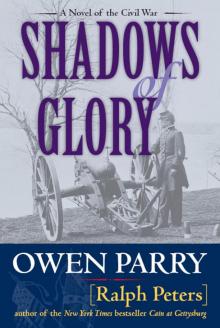 Shadows of Glory
Shadows of Glory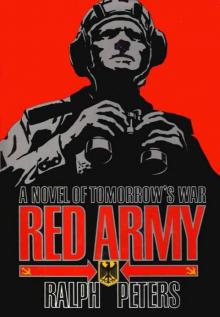 Red Army
Red Army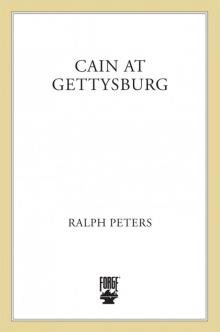 Cain at Gettysburg
Cain at Gettysburg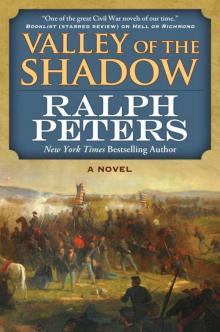 Valley of the Shadow: A Novel
Valley of the Shadow: A Novel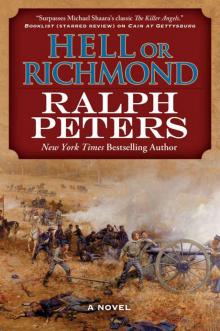 Hell or Richmond
Hell or Richmond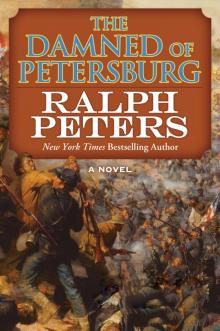 The Damned of Petersburg
The Damned of Petersburg The War After Armageddon
The War After Armageddon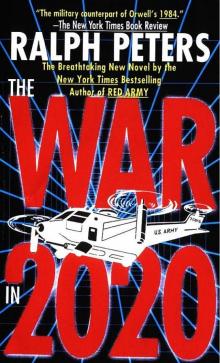 The War in 2020
The War in 2020